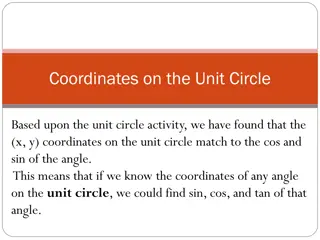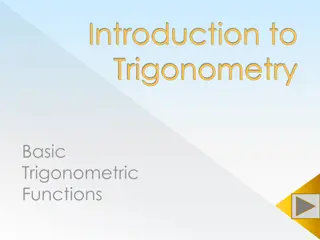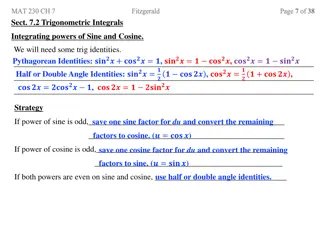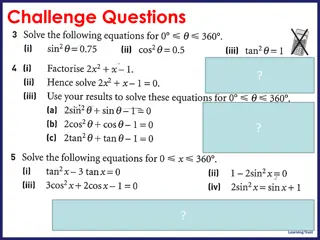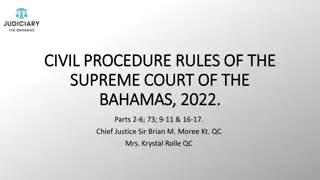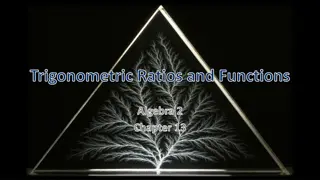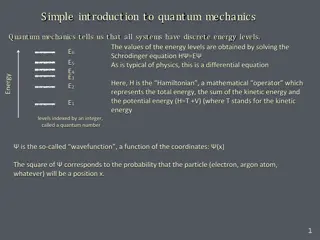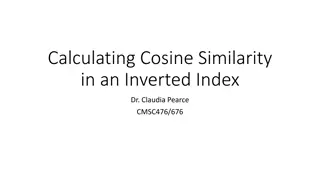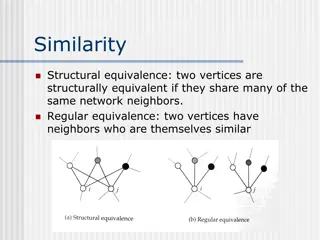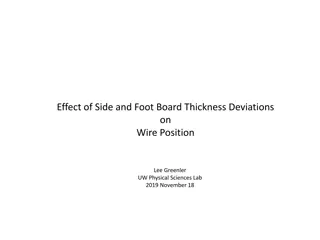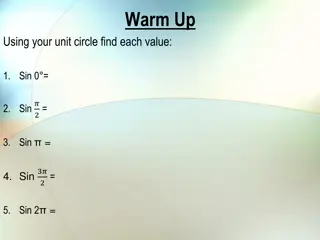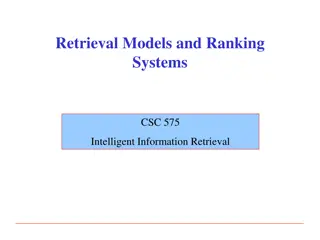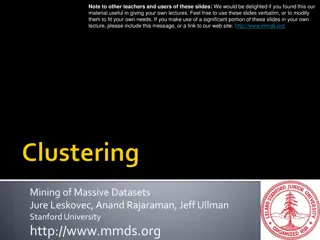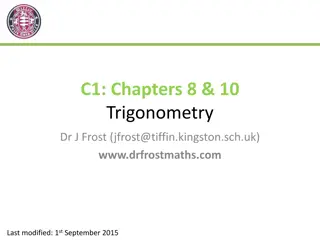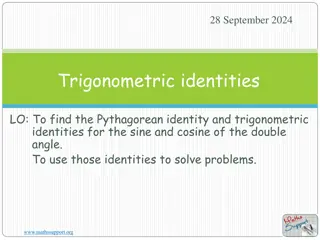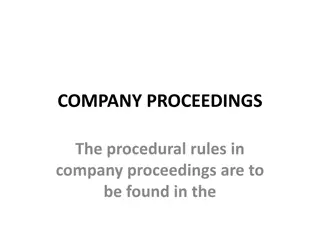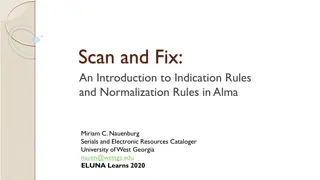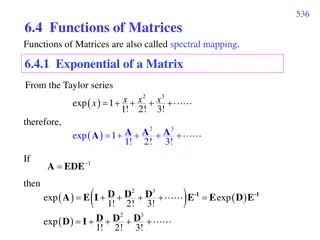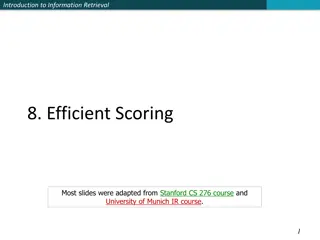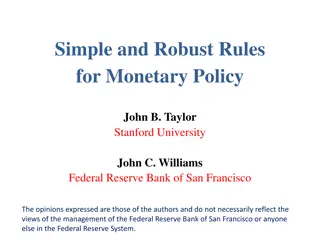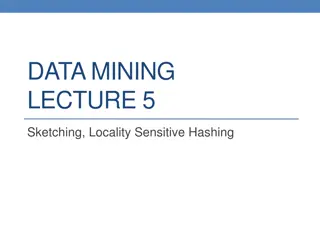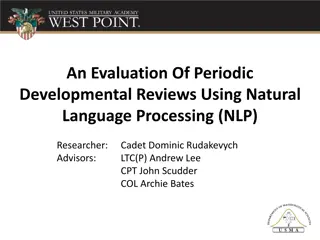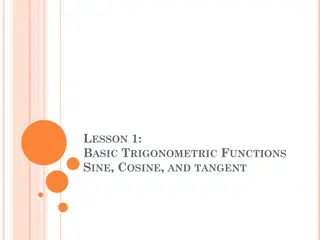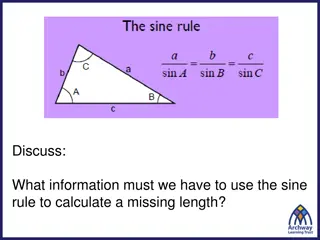AnglE: An Optimization Technique for LLMs by Bishwadeep Sikder
The AnglE model introduces angle optimization to address common challenges like vanishing gradients and underutilization of supervised negatives in Large Language Models (LLMs). By enhancing the gradient and optimization processes, this novel approach improves text embedding learning effectiveness.
9 views • 33 slides
Solving right triangles
Discover how to solve right triangles using trigonometric ratios and angle measures. Explore examples and real-world applications, such as calculating street grades in San Francisco. Learn how to identify angles using sine, cosine, and tangent ratios, and use inverse trigonometric functions to find
0 views • 26 slides
Coordinates on the Unit Circle
Exploring how the coordinates on the unit circle correspond to trigonometric functions like sine, cosine, and tangent. Learn how to find these values for angles on the unit circle and how to apply trigonometry principles when points are not on the unit circle.
9 views • 6 slides
Civil Procedure Rules Parts 18-23
The new civil procedure rules cover various aspects such as counterclaims, additional claims, changes to parties, representative parties, miscellaneous rules, and rules regarding minors and patients. The overriding objective is to ensure cases are dealt with justly and at a proportionate cost, consi
2 views • 49 slides
Basic Trigonometry Concepts
Trigonometry is the study of triangles and the relationship between their sides and angles, particularly in right triangles. This introduction covers the basic trigonometric functions such as sine, cosine, and tangent, explaining their ratios in relation to angles and sides. By understanding these f
0 views • 16 slides
Trigonometric Integrals: Strategies and Identities
Learn useful trigonometric identities and strategies for integrating powers of sine and cosine. Understand when to use Pythagorean, Half or Double Angle Identities, and how to handle odd or even powers efficiently. Examples provided for clarity.
1 views • 14 slides
Motorboat Training, testing, and licensing: Rules of the Road & Aids to Navigation Manual
This presentation covers essential information on motorboat training, testing, and licensing, focusing on rules of the road and aids to navigation. It includes details on navigation rules, the importance of following them to prevent accidents, and where the rules apply. The content also explains who
0 views • 34 slides
The New Civil Procedure Rules Parts 18-23
The new civil procedure rules cover various aspects like counterclaims, addition of parties, changes to case statements, representative parties, miscellaneous rules about parties, and rules regarding minors and patients. The overriding objective is to ensure cases are dealt with justly and at a prop
5 views • 49 slides
Trigonometric Problems: Mixed, Sine and Cosine Rules
This strand delves into trigonometric problems focusing on triangles with mixed information, exploring side lengths and angle measurements beyond right-angled triangles. It covers mixed problems, sine and cosine rules, applying area of any triangle, and Heron's formula. Engage in various exercises i
3 views • 28 slides
Trigonometry: Identities, Equations, and Problem Solving Techniques
Explore various trigonometric identities, solve trigonometry equations, and learn problem-solving techniques in trigonometry. Discover how to use basic trigonometry to find missing sides, understand trigonometric identities, and tackle challenging trigonometry problems involving sine, cosine, and ta
1 views • 17 slides
Civil Procedure Rules of the Supreme Court of The Bahamas, 2022
The Civil Procedure Rules of the Supreme Court of The Bahamas, 2022 detail the application of CPR to civil proceedings, highlighting exceptions, the Woolf Reforms, and key provisions such as active case management and the overriding objective. The rules also address proceedings commenced before the
2 views • 30 slides
Trigonometric Ratios and Examples
Trigonometry involves studying the relationships between the angles and sides of triangles. This content covers trigonometric ratios in right-angled triangles, including sine, cosine, tangent, secant, cosecant, and cotangent. It provides examples and illustrations to help understand how to apply the
1 views • 20 slides
Financial and Eligibility Rules for EU Cooperation Programmes
Financial and eligibility rules for EU cooperation programmes include details on the first-level control unit, sources of information, hierarchy of rules, overarching eligibility rules, and reporting overview. These rules cover areas such as project activities, expenditure eligibility, procurement r
3 views • 27 slides
Trigonometric Ratios and Functions in Algebra 2
This chapter in Algebra 2 focuses on trigonometric ratios and functions related to right triangles. It covers concepts such as sine, cosine, tangent, cotangent, secant, and cosecant functions. The content explains how to evaluate these functions for angles in right triangles, special right triangles
0 views • 37 slides
Introduction to Quantum Mechanics: Energy Levels and Schrödinger Equation
Quantum mechanics reveals that all systems possess discrete energy levels, determined by solving the Schrödinger equation where the Hamiltonian operator represents total energy. In a particle-in-a-box scenario, potential energy is infinite outside the box. The Schrödinger equation simplifies to a
0 views • 12 slides
Cosine Similarity in Inverted Index for Querying
In this document, Dr. Claudia Pearce explains how to build and query from an inverted index, focusing on calculating the Cosine Similarity. The process involves calculating the dot product of terms in the document and query, updating sums based on term weights, and understanding the significance of
0 views • 15 slides
Rural Access Compliance Rules Proposal by Glenn Disher - PBM Investigator
Proposal by Glenn Disher, a PBM Compliance Investigator, outlines rules for rural access compliance. The proposal focuses on considering local conditions and enforcing rules for maximum impact. It includes recommendations for zip code rules, compliance mileage rules, and examples of non-compliant ru
0 views • 7 slides
Structural Equivalence and Similarity Measures in Network Analysis
This content discusses the concepts of structural equivalence and regular equivalence in network analysis. Structural equivalence is based on shared network neighbors, while regular equivalence considers the similarities of neighboring vertices. Various measures, such as cosine similarity and Pearso
0 views • 12 slides
Impact of Board Thickness Deviations on Wire Displacement
In this study by Lee Greenler at UW Physical Sciences Lab, the effect of side and foot board thickness deviations on wire position was analyzed. The displacement of the wire was found to vary based on the cosine factor, with potential displacements up to ~0.5mm near the pin. Different cases were con
0 views • 5 slides
Sine and Cosine Functions in Graphs
Exploring the unit circle to find values of sine at different angles, understanding periodic functions, and graphing sine and cosine functions with variations in amplitude and periods. Learn about vocabulary related to sin waves, amplitude, and period, and discover how to sketch the graph of y = sin
0 views • 15 slides
Company Attribution Rules in Legal Proceedings
Company attribution rules in legal proceedings are outlined, focusing on primary rules found in a company's constitution, general principles of agency, and exceptions where traditional attribution methods may not apply. The interpretation of laws involving companies and the application of specific a
0 views • 7 slides
Intelligent Information Retrieval: Models, Ranking, and Algorithms
Explore the intricacies of retrieval models, ranking systems, and algorithms in the field of Intelligent Information Retrieval. Learn about the construction of indices, matching and scoring processes, distinguishing between exact-match and best-match retrieval, ranking algorithms like Boolean matchi
0 views • 36 slides
Data Structures in High-Dimensional Space
Explore the concept of clustering data points in high-dimensional spaces with distance measures like Euclidean, Cosine, Jaccard, and edit distance. Discover the challenges of clustering in dimensions beyond 2 and the importance of similarity in grouping objects. Dive into applications such as catalo
0 views • 55 slides
Layout and Electrical Rules Check by KANTHARAJU P.K.
Layout rules check is essential in preparing masks for fabrication processes to ensure accuracy. Key design rules include minimum width, spacing, enclosure, and extension. Electrical rules checking (ERC) methodology is used to verify design robustness against electronic design rules at schematic and
0 views • 15 slides
School Rules and Expectations at SCMS
This content outlines the rules, expectations, and procedures for students at SCMS, emphasizing responsibility, accountability, and respect. It covers district-wide rules, brave expectations aligned with those rules, common procedures for all students, and specific guidelines for morning routines. T
0 views • 23 slides
Trigonometry Concepts: Graphs, Symmetry, and Laws Explained
Explore trigonometry concepts such as sine, cosine, and tangent graphs, symmetry in trigonometric functions, and laws of trigonometric functions. Understand how to determine values using symmetry and graph analysis. Practice identifying values in the range 0 to 360 for sine, cosine, and tangent func
1 views • 22 slides
Trigonometric Identities for Double Angles
Special identities like the Pythagorean identity and double angle identities for sine and cosine are explored in this content. The Pythagorean identity states that cosine squared plus sine squared equals one, while the double angle identities provide formulas for cosine of double angles. Through the
0 views • 13 slides
Trigonometric Graphs and Patterns
Explore trigonometric graphs, key features, and transformations. Learn to calculate sine and cosine values, recognize symmetries, and work with acute angles for solving trigonometric problems. Dive into the world of sine, cosine, and tangent functions with visual aids and practice exercises.
0 views • 15 slides
Text Similarity Techniques in NLP
Explore various text similarity techniques in Natural Language Processing (NLP), including word order, length, synonym, spelling, word importance, and word frequency considerations. Topics covered include bag-of-words representation, vector-based word similarities, TF-IDF weighting scheme, normalize
3 views • 62 slides
Time and Value of Supply in VAT Webinar Series
This course note covers the essential aspects of time and value of supply in relation to VAT rules. It explains key rules that determine when VAT must be accounted for and paid, focusing on important regulations impacting vendors. Topics include general time of supply rules, rules for connected pers
0 views • 44 slides
Procedural Rules in Company Proceedings
Procedural rules governing company proceedings can be found in the Companies Proceeding Rules, Companies Winding-Up Rules, and the Federal High Court (Civil Procedure) Rules. These rules dictate the process for applications, such as Originating Summons, Originating Motion, or Petition under CAMA. Th
1 views • 22 slides
Scan and Fix: Indication and Normalization Rules in Alma
Introduction to indication rules and normalization rules in Alma Miriam C. Nauenburg's presentation on the scan and fix workflow. Learn about creating and applying indication and normalization rules, testing rules in the Metadata Editor, and organizing rules as private or shared.
0 views • 54 slides
Matrix Functions and Taylor Series in Mathematics
A detailed exploration of functions of matrices, including exponential of a matrix, eigenvector sets, eigenvalues, Jordan-Canonical form, and applications of Taylor series to compute matrix functions like cosine. The content provides a deep dive into spectral mapping, eigenvalues, eigenvectors, and
0 views • 53 slides
Efficient Scoring Techniques in Information Retrieval
Today's focus in Information Retrieval is on efficiently scoring and ranking documents matching a query from an inverted index. The goal is to assign scores to each document and select the top K highest scoring ones. Cutting down CPU usage for scoring while maintaining result quality is essential. T
0 views • 18 slides
Simple and Robust Rules for Monetary Policy Overview
This document discusses the historical background, empirical experience, characteristics of simple rules, robustness, and the comparison between optimal control and simple rules in monetary policy. It explores the evolution of policy rules from Smith and Ricardo to modern approaches, emphasizing the
0 views • 22 slides
Capacity Allocation Mechanisms (CAM) Business Rules Workshop Summary
This summary provides insights into the Capacity Allocation Mechanisms (CAM) Business Rules Workshop held at Ashling Hotel, Dublin on July 2, 2014. The workshop covered topics such as CAM business rules scope, key features, auction processes, code modifications, implementation timelines, and consult
1 views • 32 slides
Sketching and Locality Sensitive Hashing in Data Mining
Explore the concepts of Jaccard Similarity and Cosine Similarity in data mining, along with their applications in recommendation systems and finding near-duplicates. Discover how Sketching and Locality Sensitive Hashing techniques help in efficiently identifying similar items and solving the Nearest
0 views • 63 slides
Utilizing Natural Language Processing for Periodic Developmental Reviews Analysis
This study focuses on evaluating Periodic Developmental Reviews (PDRs) using Natural Language Processing (NLP) to predict cadet ratings and detect copying of responses. With objectives to analyze text statements in PDRs and investigate the prevalence of response duplication, the research aims to pro
0 views • 19 slides
Basic Trigonometric Functions: Sine, Cosine, and Tangent
Delve into the fundamental trigonometric functions of sine, cosine, and tangent with this introductory lesson. Learn how these functions relate to angles and triangles, and discover their essential properties and applications. Build a strong foundation in trigonometry as you explore the relationship
0 views • 20 slides
Using Sine and Cosine Rules in Geometry
Explore how to determine missing lengths and angles in triangles using the sine and cosine rules. Understand when to apply each rule based on available information. See examples and illustrations to enhance your understanding.
0 views • 15 slides


